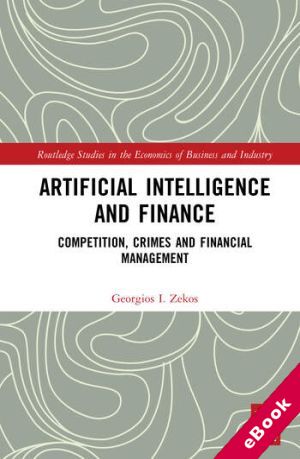
The device(s) you use to access the eBook content must be authorized with an Adobe ID before you download the product otherwise it will fail to register correctly.
For further information see https://www.wildy.com/ebook-formats
Once the order is confirmed an automated e-mail will be sent to you to allow you to download the eBook.
All eBooks are supplied firm sale and cannot be returned. If you believe there is a fault with your eBook then contact us on ebooks@wildy.com and we will help in resolving the issue. This does not affect your statutory rights.
Artificial Intelligence (AI) has been increasingly shaping the organization and operation of global capital markets by backing the consequences of algorithmic trading. However, concerns about the growing contribution of AI are mounting, particularly in relation to its potential to destabilize fair and orderly trading. This book examines the impact of AI upon Finance, financial management, competition and crimes. It presents the AI-driven economy by combining a theoretical framework with econometric analysis and involves a discussion of the intersection of novel areas, including blockchain and AI. It investigates the AI-driven economy from four perspectives: economic impacts and financial implications, technological innovation and political considerations. This interdisciplinary approach enables a holistic analysis of the subject, ensuring its relevance.
The book begins by signalling the latest advancements in AI and its significance for the economy, presenting new forms of finance. It investigates the role of AI within financial markets, followed by an analysis of the role of AI upon developments in finance, financial management and governance, with an emphasis on metaverse and Non-Fungible Tokens (NFTs), Central Bank Digital Currencies (CBDCs), cyber assets and digital currencies. The role of competition upon finance is highlighted and financial crimes and their influence upon financial markets is examined. The book will find an audience among researchers and students in the field of economics, finance or business, as well as economists, lawyers, and financial and cybersecurity professionals.